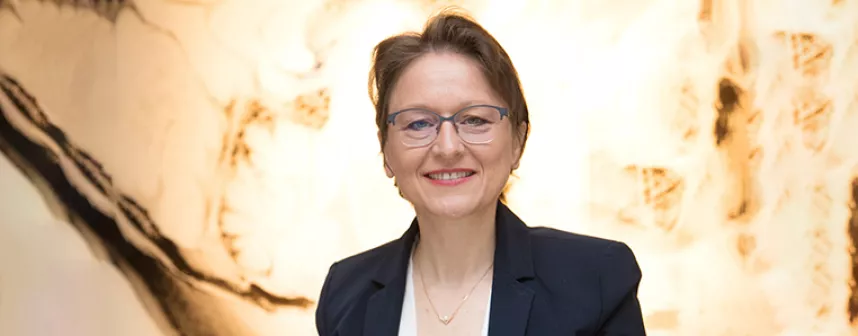Sonia Lippke: Excellent Psychological Application Research
August 3, 2022
Exchange with colleagues from all over the world and interdisciplinary collaboration are important to her: Sonia Lippke, Professor of Health Psychology and Behavioral Medicine at Jacobs University, has now been awarded the Distinguished Scientific Contributions Award by the International Association of Applied Psychology (IAAP). She was furthermore appointed as member of the Ninth Ageing Report Commission of the Federal German Government.
"I am particularly pleased that I also received the award for my work on a theory of behavior change and health care that I developed more than ten years ago. It is now being applied in very different contexts," the scientist said. Her Compensatory Carry-Over Action Model takes a holistic view of people and their different behaviors and creates assumptions about how they relate to each other. This makes it possible to better understand lifestyles and to support people with their preventative healthcare and rehabilitation in the long run.
Promoting the well-being and health of people in everyday life and at work, as well as promoting self-care to those affected, is at the heart of her work and would not be possible without sufficient communication- another important topic within her research. Especially as communication between medical staff and patients can often be difficult. Therefore, Sonia Lippke's research group has developed an app that allows people giving birth, their partners, and also obstetric staff to improve their communication skills. The "TeamBaby App" is available free of charge until the end of 2022.
The preservation of health has always been a topic of high social relevance and has developed even more significance during the pandemic – so has health psychology. How can you protect yourself? How to keep your distance and still stay well connected? How to remain psychologically healthy? What action and coping strategies help in such crisis situations? "Our research helps to overcome these challenges," Lippke said.
Even before the COVID outbreak, she had been dealing with the topic of loneliness. In times of remote work and distance learning, many people suffered from being alone and feeling isolated. Before the pandemic, this applied to one in five individuals; in 2020 and 2021, this number increased to one in three, as Lippke and her team found out. She sees one of her aims, as a scientist in this field, as finding ways to enable people to participate socially and encouraging them to become active. The waning trend of the pandemic is making a positive contribution, and for many, normal everyday life has returned. "Most people are getting their lives back, we have become more resilient as a society," Lippke is convinced.
What will remain, however, is another consequence of the mass disease: "Long-COVID will be with us for the long term, even after the pandemic is over," she mentioned. Estimates suggest that up to ten percent of all COVID patients are affected. Fatigue, impaired concentration, loss of taste and smell are some of the symptoms those affected suffer from. As a scientific partner of the Dr. Becker Clinic Group, Sonia Lippke's research group is working on a care concept for the affected called "ASAP," or Assisted, Immediate, Augmented Post-/Long-COVID Plan. The goal is to develop a holistic, sustainable treatment pathway for adults to support recovery and minimize consequences. Affected people can support the research through an online survey; individuals from Bavaria can be accompanied by trained personnel and diagnosed in more detail in a clinic assessment.
The pandemic has changed not only Lippke’s research, but also her teaching. "We switched to digital teaching very successfully within a short period of time," Lippke said. But she also experienced the limitations of digital communication: "Loneliness is also a big issue with young people: they are looking for friendships. For some, social skills are not yet as developed, and for them we have to build bridges, let them catch up on what they've missed, and find digital solutions."
Lippke teaches courses in Health Psychology, Communication and Interaction in the psychology program at Jacobs University. Starting in the fall she will also offer a course dealing with the psychology of digital interventions. She has been active at the private university since 2011, along with the Bremen International Graduate School of Social Sciences (BIGSSS). Again, it is the close collaboration across disciplines and the diversity of students from more than 110 nations that continue to excite her. "On our campus, the whole world comes together. Of course, this also leads to conflicts, but we are able to solve them and also use them so that everyone learns from them," she exclaimed.
The scientist herself has a very diverse background. She grew up in Mexico and Spain, attended school and university in Germany, and has since taught in the Netherlands, China and Canada. Especially in dealing with the pandemic, her diverse contacts were very valuable. For example, she had worked closely with Chinese researchers who were the first to encounter the virus. "That helped me to be better prepared for what could happen in our country," she explained.
She appreciates the cooperation with Chinese researchers in particular and would like to see the contacts maintained. She was to be presented with her IAAP award in Beijing this July. Unfortunately, the award ceremony has been postponed. Instead, she is traveling in Germany to pursue new tasks.
In July 2022, Lippke was appointed member of the Ninth Ageing Report Commission of the Federal Government. This is another opportunity for collaboration across disciplines, seeking to understand aging and the demographic changes of the society better, and improving longevity in times of crises such as pandemics, climate change and war. Furthermore, she was appointed BiB Fellow. With this title, the Federal Institute for Population Research honors excellent researchers whose work significantly contributes to the field of population research.
This text is part of the series "Faces of Jacobs", in which Jacobs University introduces students, alumni, professors and staff. Further episodes can be found at www.jacobs-university.de/faces
